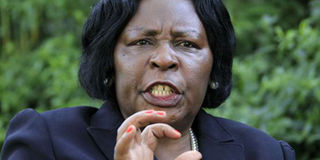Ex-Deputy CJ Baraza pleads for fairness in Tunoi’s bribe case

Former Deputy Chief Justice Nancy Baraza responds on the events that led to her resignation during an interview on February 6, 2016 at Serena Hotel. She decided to break her silence because of the Justice Tunoi storm. PHOTO | JEFF ANGOTE | NATION MEDIA GROUP
What you need to know:
- However, Ms Baraza on Saturday faulted the JSC for sending a confidential letter to the President rather than send a recommendation.
- Ms Baraza, who practises farming and is also a law lecturer at the University of Nairobi, said she does not condone corruption in the Judiciary at all.
- Noting that a judge taking a bribe is the biggest betrayal, she said Justice Tunoi and the team he sat with on the Bench should only be punished if found culpable.
Former Deputy Chief Justice Nancy Baraza has broken her silence and called for fair treatment of Supreme Court Judge Philip Tunoi, who will be facing a tribunal over graft allegations.
Ms Baraza, who ended her four-year silence since she resigned from her post, was particularly incensed that when the Judicial Service Commission heard her following claims that she harassed a guard, it sent a communication to the President recommending action even before she could face a tribunal.
Ms Baraza quit her job in October 2012 in the middle of a case she had lodged at the Supreme Court.
She had filed the case after a tribunal found her conduct wanting in the manner she handled Village Market guard Rebecca Kerubo on December 31, 2011.
“I didn’t think it was fair (the tribunal decision). I thought it was a very injudicious finding and I appealed … it more or less said ‘you can’t even breathe God’s oxygen,’” she said during an interview with Nation Media Group journalists.
Before the tribunal was formed, a JSC team had heard her and recommended that she be probed.
However, Ms Baraza on Saturday faulted the JSC for sending a confidential letter to the President rather than send a recommendation.
“They wrote a confidential letter as members of the JSC, signed by the chairman of the JSC, who is the Chief Justice, telling the President that ‘we cannot work with her’. It was sent confidentially to the President they purported to appoint a tribunal."
“So, why waste Kenyans’ money appointing a tribunal which actually consumes money when already, under a cover of confidence, you have written your decision?” she asked.
Ms Baraza, who practises farming and is also a law lecturer at the University of Nairobi, said she does not condone corruption in the Judiciary at all.
Noting that a judge taking a bribe is the biggest betrayal, she said Justice Tunoi and the team he sat with on the Bench should only be punished if found culpable.
“If the tribunal finds him guilty with concrete evidence, for heaven’s sake, it is corruption and it is bad. But don’t ruin a man’s career on allegations. As for the other judges, again just don’t condemn. If there is evidence, let the law apply in this matter because they must get rid of corruption. If they have eaten money, they have no reason being in the Supreme Court. But let it not just be allegations,” she said.
WHY I RESIGNED
She also queried the criteria that JSC uses to appoint judges, saying it converts corrupt lawyers to corrupt judicial officers.
“They (JSC) are the ones who vet these fellows and now some lawyers who have found their way into the hallowed places of judgeship; people who have very dubious history [of corruption] as lawyers… it depends on which people you are bringing to the Judiciary. Is the JSC doing its job carefully and meticulously? Because then there are fellows who don’t need to be in that court at all,” she said.
Ms Baraza also criticised Chief Justice Willy Mutunga for discussing her case on a morning TV show when her appeal against a tribunal decision was being heard at the Supreme Court.
“The Chief Justice went to a TV show called Cheche and he talked about my case and actually in not very flattering terms: ‘People who behave like Nancy Baraza, they should be dealt with.’ That is, he had judged me and that case was in the Supreme Court; it is coming before him,” said Ms Baraza.
She said Dr Mutunga’s act was what made her withdraw her case and opt for resignation.
Ms Baraza also called for a review of the procedure for disciplining judges, asking why a judge who sits in the JSC can again be the one to hear an appeal when the judge is dissatisfied with the tribunal’s decision.
“When you appeal from the tribunal, it goes to the Supreme Court. Now, what was the composition of the Supreme Court? It was the Chief Justice and Justice [Smokin] Wanjala who sit on the JSC. And you remember JSC were my accusers. They already had listened, and just like they are doing to Justice Tunoi, and made a decision on me for a tribunal to be formed. So, which means, they had arrived at a conclusion,” she said.
On the altercation that saw her leave the Judiciary, Ms Baraza said she regrets the way she treated Ms Kerubo, saying she would look for her for a talk.
“One of the lessons I have learnt is that we relate at different levels. Maybe the way I would explain something to Larry Madowo (one of the interviewers) is different from how I would explain to a person like Kerubo. So, may be she thought I was rude,” said Ms Baraza.
She said she had decided to break her silence because of the Justice Tunoi storm, insisting that she has no grudge with anyone in the Judiciary.





